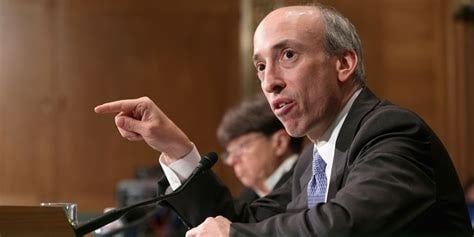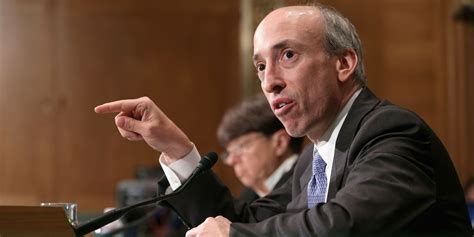Garry Gensler, Biden’s current Head of the SEC, in 2015 and 2016 was running Hillary’s campaign finances at the same time millions flew from her campaign to entities with the sole purpose of making up a Russia collusion story that eventually led to spying on candidate and President Trump.
When Hillary Clinton was putting together her 2016 Presidential campaign, she brought in Garry Gensler as her Chief Financial Officer. CNN reported in April 2015:
Hillary Clinton’s campaign will add to its top ranks a man who’s known for being tough on Wall Street.
Gary Gensler, the former chairman of the Commodity Futures Trading Commission, will serve as the Clinton campaign’s chief financial officer, Bloomberg reported.
TRENDING: BREAKING: The FED Announces Closed Meeting to be Held Monday Morning Under Expedited Procedures
Gensler would bring a wealth of knowledge about the financial industry, as well as the federal agencies that regulate it, to the newly launched campaign.
He was chairman of the CFTC, the government agency that oversees the derivatives markets, from 2009 to 2014. He previously served in senior Treasury Department roles under President Bill Clinton, and prior to joining the Clinton administration worked at Goldman Sachs for almost 20 years.
By early January of 2016, things had worn off and Hillary had some competition. Those supporting her only competitor, socialist Bernie Sanders, were not happy with Gensler, the former Goldman Sachs guy. The Intercept wrote at that time:
Hillary Clinton is using a prominent surrogate to attack Bernie Sanders’ emphatic proposals for reforming Wall Street: Gary Gensler, former chair of the Commodity Futures Trading Commission.
Gensler, who is the Clinton campaign’s chief financial officer, has enormous credibility among financial reformers after his aggressive (and lonely) efforts to rein in banks during the early years of the Obama administration.
As a result, the Clinton campaign has tapped him to fend off Sanders and make the difficult case that Clinton is genuinely interested in cleaning up Wall Street.
Gensler, for instance, delivered a pre-buttal before Sanders’ speech on Tuesday, and deemed it insufficient afterward.
But Gensler’s attacks on Sanders come across as hollow given that the Clinton campaign has been largely silent on the issue that defined Gensler’s legacy – the regulation of derivatives – and the undermining of that legacy by the man Obama chose to succeed him.
It was also clear at this time that Gensler was running Hillary’s campaign finances. Gensler also worked with Hillary’s attorney Marc Elias in creating the Hillary Victory Fund, according to Bloomberg in a piece in June 2016:
Gensler’s portfolio stretches into other areas as well. He, along with campaign lawyer Marc Elias and national finance director Dennis Cheng, led the process last year to create the Hillary Victory Fund, which jointly raises money for the campaign, the DNC, and state Democratic parties.
Elias was Hillary’s general counsel at the time Gensler was CFO.
Elias served as general counsel for Hillary Clinton’s 2016 presidential campaign. On Monday, Clinton shared news of the Elias Law Group’s launch on Twitter, writing, “Glad to see one of our most powerful warriors for the right to vote extend its practice.”
When Donna Brazile took over the DNC in the summer of 2016 she learned that Hillary Clinton had taken over the DNC back in 2015, long before the first primary took place. Far-left Politico shared notes from Brazile’s book published a year later.
The Saturday morning after the convention in July, I called Gary Gensler, the chief financial officer of Hillary’s campaign. He wasted no words. He told me the Democratic Party was broke and $2 million in debt.
“What?” I screamed. “I am an officer of the party and they’ve been telling us everything is fine and they were raising money with no problems.”
That wasn’t true, he said. Officials from Hillary’s campaign had taken a look at the DNC’s books. Obama left the party $24 million in debt—$15 million in bank debt and more than $8 million owed to vendors after the 2012 campaign—and had been paying that off very slowly. Obama’s campaign was not scheduled to pay it off until 2016. Hillary for America (the campaign) and the Hillary Victory Fund (its joint fundraising vehicle with the DNC) had taken care of 80 percent of the remaining debt in 2016, about $10 million, and had placed the party on an allowance…
…On the phone Gary told me the DNC had needed a $2 million loan, which the campaign had arranged.
“No! That can’t be true!” I said. “The party cannot take out a loan without the unanimous agreement of all of the officers.”
“Gary, how did they do this without me knowing?” I asked. “I don’t know how Debbie relates to the officers,” Gary said. He described the party as fully under the control of Hillary’s campaign, which seemed to confirm the suspicions of the Bernie camp. The campaign had the DNC on life support, giving it money every month to meet its basic expenses, while the campaign was using the party as a fund-raising clearinghouse…
…When I got back from a vacation in Martha’s Vineyard, I at last found the document that described it all: the Joint Fund-Raising Agreement between the DNC, the Hillary Victory Fund, and Hillary for America.
The agreement—signed by Amy Dacey, the former CEO of the DNC, and Robby Mook with a copy to Marc Elias—specified that in exchange for raising money and investing in the DNC, Hillary would control the party’s finances, strategy, and all the money raised. Her campaign had the right of refusal of who would be the party communications director, and it would make final decisions on all the other staff. The DNC also was required to consult with the campaign about all other staffing, budgeting, data, analytics, and mailings…
…When I was manager of Al Gore’s campaign in 2000, we started inserting our people into the DNC in June. This victory fund agreement, however, had been signed in August 2015, just four months after Hillary announced her candidacy and nearly a year before she officially had the nomination.
The Hillary campaign took over the DNC’s financials and then hid how the money was being spent by funneling it through its attorney Elias and Perkins Coie. Millions were passed onto its attorneys where they used this money for activities being investigated by the Durham investigation now. The Clinton campaign paid Perkins Coie $5.6 million in legal fees from June 2015 to December 2016, according to campaign finance records, and the DNC paid the firm $3.6 million.
We now know the money that Hillary’s team paid entities to link Trump to Russia.



